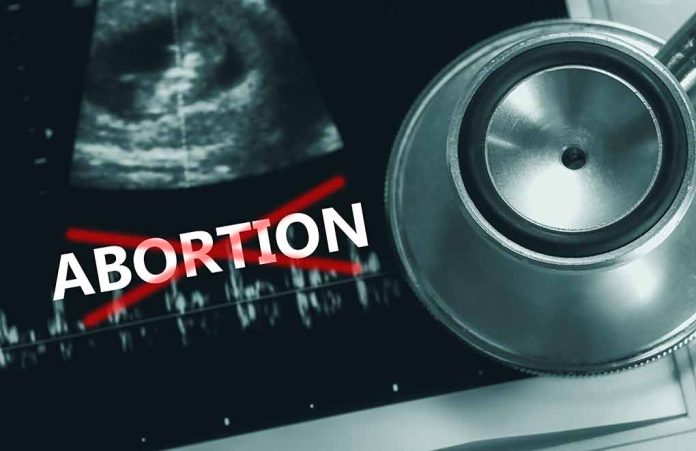
A Pennsylvania teenager’s horrifying text message “it’s still moving” after aborting her 20-week pregnancy reveals the disturbing reality of an illegal late-term chemical abortion that has now landed both her and her mother in serious legal trouble.
Key Takeaways
- A Pennsylvania mother purchased illegal abortion pills online for her teenage daughter who was 20 weeks pregnant, well beyond the 10-week limit for chemical abortions in the state.
- After taking the pills, the teen delivered what she described as a “full baby” that was “still moving,” kept the remains under her bed for 37 hours, then buried the body in the backyard.
- The mother faces charges including endangering the welfare of a child and corruption of minors, while the daughter is charged with abuse of a corpse and concealing a child’s death.
- The case highlights serious safety concerns about unsupervised use of abortion medication, particularly beyond FDA-approved gestational limits.
- Despite abortion being legal in Pennsylvania up to 24 weeks, this case involves criminal charges related to treatment of the remains and child endangerment, not the abortion itself.
Disturbing Details Emerge in Illegal Home Abortion Case
Lancaster County authorities have charged a mother and daughter in a deeply troubling case involving an illegal late-term chemical abortion performed at home. Shannon Jones allegedly purchased abortion medication online for her juvenile daughter without medical supervision when the girl was approximately 20 weeks pregnant. According to police reports, the daughter gave birth on May 10, 2024, after taking the pills, and witnessed movement from the infant. The teenager kept the remains in a box under her bed for more than a day and a half before burying the body in their backyard.
Text messages revealed the daughter told her mother the aborted baby was “still moving” and described it as a “full baby.” These disturbing communications also documented the mother’s growing concern about potential consequences, with Shannon Jones telling a witness she was “paranoid” and stating “we’re either going to get arrested or I’m going to get divorced,” according to court documents.
Legal Implications and Charges
Authorities were alerted to the situation in March 2025 after a witness provided photos and messages about the incident. Investigators subsequently discovered skeletal remains in the family’s backyard. The Lancaster County Coroner’s office ruled the cause of death as “premature fetal death” and manner of death as “undetermined.” Because the coroner could not conclusively determine if the baby was born alive, homicide charges were not filed in the case.
“It’s still moving,” texted the teenager after delivering what she described as a “full baby” following the administration of chemical abortion drugs at 20 weeks’ gestation.
Shannon Jones now faces multiple charges including endangering the welfare of a child, corruption of minors, and conspiracy to conceal a child’s death. She was released without bail and is scheduled for a court hearing on July 2. Her daughter, now 18 but a juvenile at the time of the incident, is charged with abuse of a corpse and concealing the death of a child. Notably, neither woman faces charges directly related to performing an illegal abortion, as Pennsylvania law exempts mothers from criminal liability in such cases.
Safety Concerns and Medical Implications
This case highlights significant safety concerns surrounding chemical abortion pills, particularly when used without medical supervision or beyond approved gestational limits. The FDA only approves abortion medication for use up to 10 weeks of pregnancy due to increasing health risks beyond this point. “The extreme gestational age in this case – approximately 20 weeks – represents a severe violation of medical guidelines and Pennsylvania law, putting the teenager at substantial physical risk,” said Shannon Jones.
FDA Commissioner Marty Makary has announced a review of one of the drugs commonly used in chemical abortions due to reports of serious medical complications. This case demonstrates precisely why such oversight is necessary, as the unsupervised acquisition and administration of these medications led to a traumatic home delivery, improper handling of human remains, and now serious criminal charges for both mother and daughter.
Legal Complexities and Pennsylvania Abortion Law
While abortion remains legal in Pennsylvania up to 24 weeks of pregnancy, this case involves charges related to the treatment of the remains and endangerment issues rather than the abortion itself. Pennsylvania law specifically exempts pregnant women from prosecution for crimes against their unborn children, which is why neither defendant faces charges directly related to the abortion. Instead, the charges focus on actions taken after the delivery and the mother’s role in facilitating dangerous medical intervention for her minor daughter.
The case presents a complex intersection of abortion law, child welfare statutes, and corpse abuse regulations. The mother’s purchase of unapproved medication for her underage daughter, the trauma of an unsupervised home delivery at 20 weeks, and the subsequent concealment and burial of human remains represent serious violations of multiple laws designed to protect both children and public health standards.





